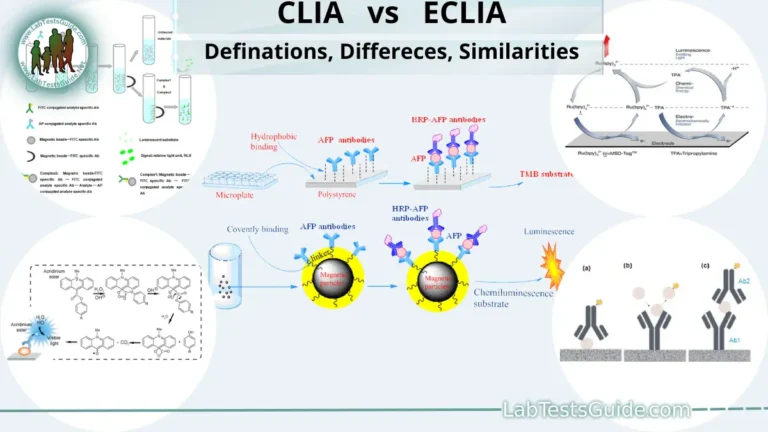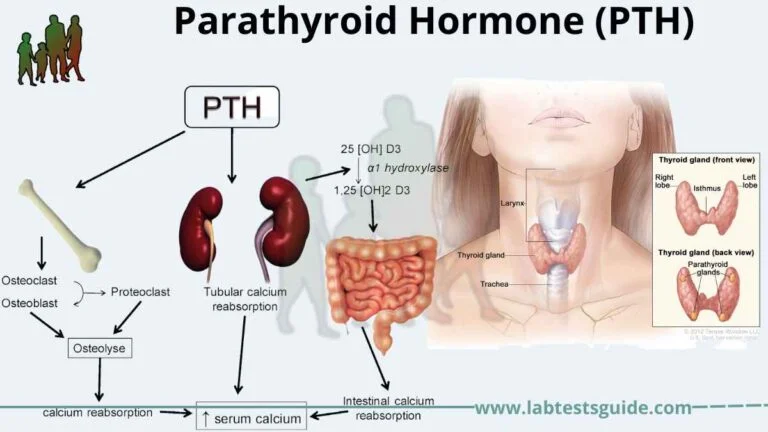Calcitonin and parathyroid hormone (PTH) are hormones that regulate calcium metabolism in the body. Calcitonin is a hormone produced by the thyroid gland that decreases the levels of calcium in the blood by promoting the deposit of calcium in the bones and the excretion of calcium in the urine. PTH is a hormone produced by the parathyroid glands that increases the levels of calcium in the blood by promoting the release of calcium from the bones and the reabsorption of calcium in the kidneys. In summary, calcitonin decreases calcium levels and PTH increases calcium levels in the blood.

Definations:
Calcitonin :
Calcitonin is a hormone produced by the thyroid gland that regulates calcium metabolism in the body by decreasing blood calcium levels, promoting calcium deposit in bones, and increasing calcium excretion in the urine.
Parathyroid Hormone (PTH) :
Parathyroid hormone (PTH) is a hormone produced by the parathyroid glands that regulates calcium metabolism in the body by increasing blood calcium levels, promoting the release of calcium from bones, and increasing reabsorption of calcium in the kidneys.
List of Similarities:
- Both hormones regulate calcium metabolism in the body.
- Both hormones are involved in maintaining normal levels of calcium in the blood.
- Both hormones are necessary for the proper functioning of the bones.
- Both hormones are important for overall health and well-being.
- Both hormones have a similar mechanism of action, they both bind to specific receptors on target cells to change the activity of intracellular signaling pathways.
- Both hormones are involved in maintaining the balance of calcium, although they have opposite actions.
- Both hormones are regulated by the levels of calcium in the blood.
List of Differences :
- Hormone source: Calcitonin is produced by the thyroid gland, while PTH is produced by the parathyroid glands.
- Effect on calcium levels: Calcitonin decreases blood calcium levels, while PTH increases blood calcium levels.
- Effect on bone: Calcitonin promotes deposit of calcium in bones, while PTH promotes release of calcium from bones.
- Effect on urine: Calcitonin increases calcium excretion in the urine, while PTH doesn’t affect it.
- Function : Calcitonin works to balance calcium levels in the blood by decreasing it while PTH increases it, helping to preserve adequate levels of calcium in the body.
- Timing of secretion: Calcitonin is secreted in response to a rise in blood calcium levels, while PTH is secreted in response to a fall in blood calcium levels.
Table of differences :
| Characteristics | Calcitonin | Parathyroid Hormone (PTH) |
|---|---|---|
| Hormone source | Calcitonin is produced by the thyroid gland | PTH is produced by the parathyroid glands |
| Effect on calcium levels | Calcitonin decreases blood calcium levels | PTH increases blood calcium levels |
| Effect on bone | Calcitonin promotes deposit of calcium in bones | PTH promotes release of calcium from bones |
| Effect on urine | Calcitonin increases calcium excretion in the urine | PTH doesn’t affect it |
| Functions | Calcitonin works to balance calcium levels in the blood by decreasing it | PTH increases it, helping to preserve adequate levels of calcium in the body |
| Timing of Secretion | Calcitonin is secreted in response to a rise in blood calcium levels | PTH is secreted in response to a fall in blood calcium levels |
FAQs
Q: What is the main function of calcitonin? A:
Calcitonin’s main function is to regulate calcium metabolism in the body by decreasing blood calcium levels, promoting calcium deposit in bones, and increasing calcium excretion in the urine.
Q: What is the main function of PTH?
A: PTH’s main function is to regulate calcium metabolism in the body by increasing blood calcium levels, promoting the release of calcium from bones, and increasing reabsorption of calcium in the kidneys.
Q: What happens when calcitonin levels are too high?
A: High levels of calcitonin can lead to decreased blood calcium levels, which can result in muscle weakness, numbness and tingling in the fingers and toes, and increased risk of osteoporosis.
Q: What happens when PTH levels are too high?
A: High levels of PTH can lead to increased blood calcium levels, which can result in kidney stones, osteoporosis, and other health problems.
Q: How do calcitonin and PTH work together?
A: Calcitonin and PTH work together to balance the levels of calcium in the blood. When blood calcium levels are too high, calcitonin is secreted to decrease the levels, and when blood calcium levels are too low, PTH is secreted to increase the levels.
Q: Can calcitonin and PTH be used to treat osteoporosis?
A: Calcitonin is sometimes used to treat osteoporosis, but PTH is not used to treat this condition.
Q: What is the difference between calcitonin and PTH in terms of duration of action?
A: Calcitonin has a shorter duration of action than PTH, meaning that its effects on calcium levels in the blood are relatively short-lived. PTH has a longer duration of action, meaning that its effects on calcium levels in the blood are longer lasting.
Possible References Used







